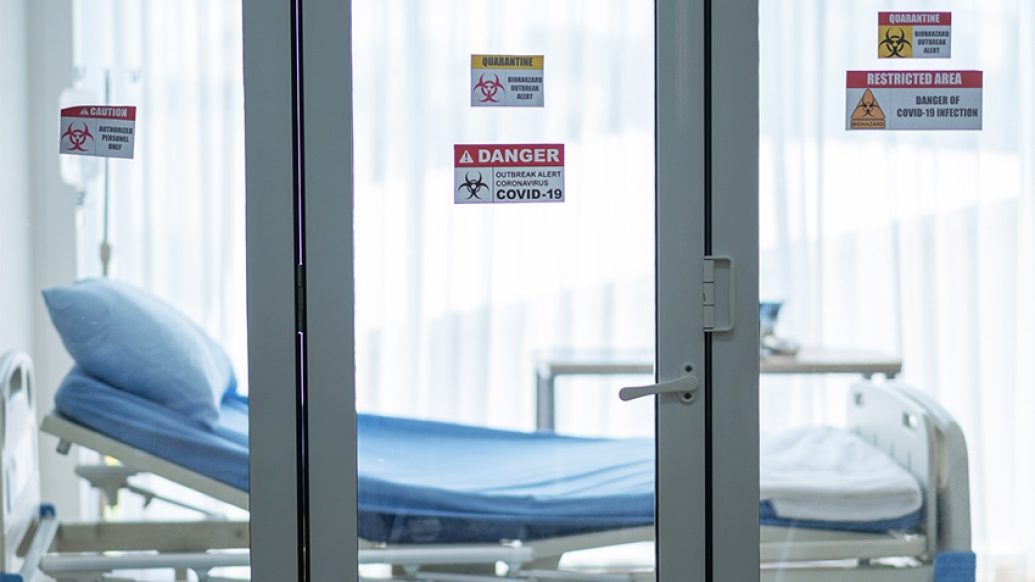Cognitive impairment is highly likely for patients in the ICU and could be lasting.
10:56 AM
Author |

More than a year into the COVID-19 pandemic, researchers are revealing the many devastating consequences that patients can face both during and after hospitalization.
A new study of nearly 150 patients hospitalized for COVID at the beginning of the pandemic found that 73% had delirium, a serious disturbance in mental state wherein a patient is confused, agitated and unable to think clearly.
Patients with delirium tended to be sicker, with more comorbidities like hypertension and diabetes, and appeared to have more severe COVID-related illness as well, said study author Phillip Vlisides, M.D., of the Department of Anesthesiology at Michigan Medicine.
"COVID is also associated with a number of other adverse outcomes that tend to prolong hospitalization and make recovery difficult," he added.
Using patient medical records and telephone surveys following hospital discharge for a group of patients hospitalized in the intensive care unit between March and May 2020, the study team attempted to identify common threads amongst patients who developed delirium. Several factors are at play, said Vlisides.
The disease itself can lead to reduced oxygen to the brain as well as the development of blood clots and stroke, resulting in cognitive impairment. In addition, inflammatory markers were greatly increased in patients with delirium. Confusion and agitation could be a result of inflammation of the brain.
Adding insult to injury, care teams often were unable to perform standard delirium reduction techniques, such as exercises designed to get a patient moving or allowing visitors or objects from home to orient patients while in the hospital.
Said Vlisides, "Early on in the pandemic, we weren't performing standard delirium prevention protocols like we usually do. A big reason for that is early on in the pandemic in the pre-vaccine era, we had limited personal protective equipment and were trying to limit COVID exposure and disease transmission."
Furthermore, there was a correlation between the use of sedatives and delirium—patients with delirium were sedated more often and frequently at higher doses. "It is common to use IV sedatives in the ICU, particular for patients on a ventilator. However, from talking to nurses, we found that patients with severe COVID were inherently more delirious and agitated at baseline, perhaps prompting more sedative use."
The study also found that cognitive impairment can persist even after discharge. Almost a third of patients did not have their delirium marked as resolved in their chart upon leaving the hospital and 40% of these patients required skilled nursing care. Almost a quarter of patients screened positive for delirium based on assessment by their caretaker. For some patients, these symptoms lasted for months. This can make managing the recovery process after hospitalization that much more difficult.
"A family member who is confused has limited ability to care for themselves and will require additional caretaking support, which is certainly a big challenge."
Vlisides acknowledges that care teams are doing the best they can with the resources they have, especially as hospitals continue to fill with patients with COVID.
"Whatever creative ways we can implement delirium prevention protocols is likely to be very helpful," he said. "That includes consistent communication with family members, bringing in pictures and objects from home, and video visits if family cannot safely visit."
And for family and other caregivers struggling to care for loved ones, he urges they get help from their primary care physician as soon as possible.
The take-home message is that for patients hospitalized with severe COVID-19, cognitive impairment—including depression and delirium—is highly likely, he added.
"Overall, this study highlights another reason why getting vaccinated and preventing severe illness is so important. There can be long term neurological complications that perhaps we don't talk about as much as we should."
In addition to Vlisides, the study authors included: Jacqueline Ragheb, Amy McKinney, Mackenzie Zierau, Joseph Brooks, Maria Hill-Caruthers, Mina Iskander, Yusuf Ahmed, Remy Lobo and Graciela Mentz.
Paper cited: "Delirium and neuropsychological outcomes in critically Ill patients with COVID-19: a cohort study," BMJ Open. DOI: 10.1136/bmjopen-2021-050045

Explore a variety of health care news & stories by visiting the Health Lab home page for more articles.

Department of Communication at Michigan Medicine
Want top health & research news weekly? Sign up for Health Lab’s newsletters today!





